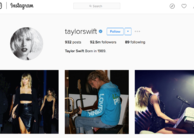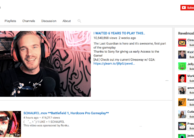|
From Elon Journal of Undergraduate Research in Communications VOL. 6 NO. 1 Instabranding: Shaping the Personalities of the Top Food Brands on Instagram
By Kate Ginsberg
Elon Journal of Undergraduate Research in Communications
2015, Vol. 6 No. 1 | pg. 2/2 | «
Although marketing on this platform has been explored in the past, this study was the first to analyze Instagram’s five leading food brand accounts. One of the major themes found was product promotion by all of the brands, which dedicated a significant amount of their accounts to showcasing their products in appealing ways. These promotional photos demonstrate Goor’s (2012) finding that product-representation brands use persuasion strategies through applying branding to their photos, although the ways in which the products were presented in the posts varied among the brands. Photos that only featured products seemed promotional; however, when people were included, the photos conveyed a more inclusive and inviting feeling. This type of content highlighted the theme of socializing. Featuring people in the images offers a more organic approach of encouraging consumers to purchase their products. Brands that highlighted people socializing with their products suggest their values of promoting the social and cultural characteristics of food. These photos support Bui’s (2014) finding that brands should include social-integrative components in their posts to engage consumers.
Previous research suggested that brands should share a variety of relevant photo content to keep consumers entertained and connected. All of the accounts in this study shared content from multiple of the coded categories, suggesting that they stand for something more than just their products. This finding is evidence that the brands are using Instagram as more than simply a marketing tool.
This variety of content suggests that brands are using their personalized profiles to showcase their multidimensional personalities. Goor (2012) proposed that these identities are evidenced when the product, brand name and product related events are featured; however, this analysis suggests that it is possible to portray these attributes without featuring products, such as through lifestyle content. This type of content presents aspects of their brands that would not be seen through the product posts, and allows for further brand individualization. The lifestyle posts suggest a more in-depth depiction of brands’ identities by presenting content about their personal interests, values, and activities. Their accounts share a visual and engaging glimpse into the lives behind their brand names, presenting themselves as loyal friends, social butterflies, inspirational coaches, and quirky creatives. These findings highlight the theme of personification, suggesting that they are using Instagram to seem more “human” in the eyes of consumers. This approach creates the opportunity for a more genuine, relevant, and meaningful relationship to be formed with consumers.
Creating these identities suggests a theme of approachability, offering a way for brands to connect and communicate with consumers on a more intimate level: evoking emotions, laughter and curiosity. Through this emotional connectedness, the brands are able to form their own communities of followers within the platform. This sense of community suggests a way to gratify users’ socializing needs Gallion (2014) mentioned. Connecting with consumers on this level could ultimately influence their buying behavior and brand loyalty.
Key limitations of this study include a rather small photo sample size due to fact that some brands are relatively new to Instagram. A larger sample could have revealed additional effective photo elements that brands are using on Instagram. Future researchers should also take into account user engagement expressed through the number of “likes” and comments on each photo. Lastly, researchers should investigate whether brands are monitoring the types of photo content their target users are posting. This insight could present new photo elements that brands should incorporate into their posts to reflect the taste of their consumers.
The author is grateful for Dr. Glenn Scott, associate professor of communications at Elon University, for his guidance, inspiration and patience, without which the article could not be published. The author also appreciates Byung Lee, associate professor of communications at Elon University, and the anonymous reviewers who have helped revise this article.
- Aaker, J. L. (1997). Dimensions of brand personality. Journal of Marketing Research, 34(3), 347-355. Retrieved December 10, 2014, from http://www.haas.berkeley.edu/groups/finance/Papers/Dimensions%20of%20BP%20JMR%201997.pdf
- Bard, M. (2010). The Start of a Great Shift. In R. Fine (Ed.), The Big Book of Social Media: Case Studies, Stories, Perspectives (pp. 5-13). Tulsa, OK: Yorkshire Publishing.
- Ben & Jerry’s. (2014). Instagram. Retrieved October 16, 2014, from http://instagram.com/benandjerrys
- Bui, Thuy-Vy. (2014). Social Media on a Stick: A uses and gratification approach toward helping mobile food vendors engage consumers on Instagram. The University of Minnesota Digital Conservancy. Retrieved November 16, 2014, from http://hdl.handle.net/11299/166761
- Braun, V., & Clarke, V. (2006) Using thematic analysis in psychology.
- Qualitative Research in Psychology, 3 (2). pp. 1-31. Retrieved December 10, 2014, from http://eprints.uwe.ac.uk/11735/2/thematic_analysis_revised
- Broyles, A. (2014, February 6). #Austin360Eats: How Instagram, social media food photography have changed how we eat. McClatchy - Tribune Business News. Retrieved from https://ezproxy.elon.edu/login?url=http://search.proquest.com/docview/1494705097?accountid=10730
- Chang, C. Y. (2014). Visualizing brand personality and personal branding : case analysis on Starbucks and Nike’s brand value co-creation on Instagram. Iowa Research Online. Retrieved December 10, 2014, from http://ir.uiowa.edu/cgi/viewcontent.cgi?article=5343&context=etd
- Gallion, A. J. (2014). Applying the uses and gratifications theory to social networking sites: a review of related literature. Academia. Retrieved September 25, 2014, from http://www.academia.edu/1077670/Applying_the_Uses_and_Gratifications_Theory_to_Social_Networking_Sites_A_Review_of_Related_Literature
- Goor, M.A. (2012). “Instamarketing”: a content analysis into marketing on Instagram. Universiteit Van Amesterdam. Retrieved October 16, 2014, from http://dare.uva.nl/cgi/arno/show.cgi?fid=449011
- Hu, Y., Manikonda, L., & Kambhampati, S. (2014). What we Instagram: a first analysis of Instagram photo content and user types. In Association for the Advancement of Artificial Intelligence Press (Eds.), Proceedings of the Eighth International AAAI Conference on Weblogs and Social Media (pp. 595- 598). Palo Alto, CA: The AAAI Press.
- McDonald’s. (2014). Instagram. Retrieved October 16, 2014, from http://instagram.com/mcdonalds
- MomentFeed index: Restaurant Instagram report Q3 2013. (2013). Momentfeed. Retrieved from September 25, 2014, https://momentfeed.com/wp-content/uploads/2013/11/momentfeed-restaurant-instagramreport-2013-q3.pdf
- Most Popular Food Brands on Instagram. (2014). TOTEMS List. Retrieved October 16, 2014, from http://list.totems.co/tag/food-brands/7662b9fa4a323cffb4d098e6d9db1d6eb236776f/sort-rank
- Oreo. (2014). Instagram. Retrieved October 16, 2014, from http://instagram.com/oreo
- Poole, S. (2012, September 28). Let’s start the foodie backlash. The Gaurdian. Retrieved from http://www.theguardian.com/books/2012/sep/28/lets-start-foodie-backlash
- Rose, G. (2012). Visual Methodologies: An Introduction to Researching with Visual Materials, (pp. 85-102). London: SAGE Publications Ltd.
- Shredz. (2014). Instagram. Retrieved October 16, 2014, from http://instagram.com/shredz
- Study: How Top Brand Marketers Use Instagram. (2013). Simply Measured, Inc. Retrieved November 13, 2014, from http://cdn2.hubspot.net/hub/303533/file-363995661-pdf/SM_Instagram_Study_FINAL.pdf
- Taco Bell. (2014). Instagram. Retrieved October 16, 2014, from http://instagram.com/tacobell
- Whiting, A., & Williams, D. (2013). Why people use social media: A uses and gratifications approach. Qualitative Market Research, 16(4), 362-369. Retrieved December 10, 2014, from http://dx.doi.org/10.1108/QMR-06-2013-0041

Figure 1. Photo elements featured in McDonald’s Instagram account.

Figure 2. Examples of McDonald’s cheerful and spirited personality.

Figure 3. Photo elements featured in Taco Bell’s Instagram account.

Figure 4. Examples of Taco Bell’s genuine and imaginative personality.

Figure 5. Photo elements featured in Shredz’s Instagram account.

Figure 6. Examples of Shredz’s tough and reliable personality.

Figure 7. Photo elements featured in Ben & Jerry’s Instagram account.

Figure 8. Examples of Ben & Jerry’s honest and light-hearted personality.

Figure 9. Photo elements featured in Oreo’s Instagram account.

Figure 10. Examples of Oreo’s genuine and imaginative personality.
Acknowledgments
The author is grateful for Dr. Glenn Scott, associate professor of communications at Elon University, for his guidance, inspiration and patience, without which the article could not be published. The author also appreciates Byung Lee, associate professor of communications at Elon University, and the anonymous reviewers who have helped revise this article.
Endnotes
- Aaker, J. L. (1997). Dimensions of brand personality. Journal of Marketing Research, 34(3), 347-355. Retrieved December 10, 2014, from http://www.haas.berkeley.edu/groups/finance/Papers/Dimensions%20of%20BP%20JMR%201997.pdf
- Bard, M. (2010). The Start of a Great Shift. In R. Fine (Ed.), The Big Book of Social Media: Case Studies, Stories, Perspectives (pp. 5-13). Tulsa, OK: Yorkshire Publishing.
- Ben & Jerry’s. (2014). Instagram. Retrieved October 16, 2014, from http://instagram.com/benandjerrys
- Bui, Thuy-Vy. (2014). Social Media on a Stick: A uses and gratification approach toward helping mobile food vendors engage consumers on Instagram. The University of Minnesota Digital Conservancy. Retrieved November 16, 2014, from http://hdl.handle.net/11299/166761
- Braun, V., & Clarke, V. (2006) Using thematic analysis in psychology.
- Qualitative Research in Psychology, 3 (2). pp. 1-31. Retrieved December 10, 2014, from http://eprints.uwe.ac.uk/11735/2/thematic_analysis_revised
- Broyles, A. (2014, February 6). #Austin360Eats: How Instagram, social media food photography have changed how we eat. McClatchy - Tribune Business News. Retrieved from https://ezproxy.elon.edu/login?url=http://search.proquest.com/docview/1494705097?accountid=10730
- Chang, C. Y. (2014). Visualizing brand personality and personal branding : case analysis on Starbucks and Nike’s brand value co-creation on Instagram. Iowa Research Online. Retrieved December 10, 2014, from http://ir.uiowa.edu/cgi/viewcontent.cgi?article=5343&context=etd
- Gallion, A. J. (2014). Applying the uses and gratifications theory to social networking sites: a review of related literature. Academia. Retrieved September 25, 2014, from http://www.academia.edu/1077670/Applying_the_Uses_and_Gratifications_Theory_to_Social_Networking_Sites_A_Review_of_Related_Literature
- Goor, M.A. (2012). “Instamarketing”: a content analysis into marketing on Instagram. Universiteit Van Amesterdam. Retrieved October 16, 2014, from http://dare.uva.nl/cgi/arno/show.cgi?fid=449011
- Hu, Y., Manikonda, L., & Kambhampati, S. (2014). What we Instagram: a first analysis of Instagram photo content and user types. In Association for the Advancement of Artificial Intelligence Press (Eds.), Proceedings of the Eighth International AAAI Conference on Weblogs and Social Media (pp. 595- 598). Palo Alto, CA: The AAAI Press.
- McDonald’s. (2014). Instagram. Retrieved October 16, 2014, from http://instagram.com/mcdonalds
- MomentFeed index: Restaurant Instagram report Q3 2013. (2013). Momentfeed. Retrieved from September 25, 2014, https://momentfeed.com/wp-content/uploads/2013/11/momentfeed-restaurant-instagramreport-2013-q3.pdf
- Most Popular Food Brands on Instagram. (2014). TOTEMS List. Retrieved October 16, 2014, from http://list.totems.co/tag/food-brands/7662b9fa4a323cffb4d098e6d9db1d6eb236776f/sort-rank
- Oreo. (2014). Instagram. Retrieved October 16, 2014, from http://instagram.com/oreo
- Poole, S. (2012, September 28). Let’s start the foodie backlash. The Gaurdian. Retrieved from http://www.theguardian.com/books/2012/sep/28/lets-start-foodie-backlash
- Rose, G. (2012). Visual Methodologies: An Introduction to Researching with Visual Materials, (pp. 85-102). London: SAGE Publications Ltd.
- Shredz. (2014). Instagram. Retrieved October 16, 2014, from http://instagram.com/shredz
- Study: How Top Brand Marketers Use Instagram. (2013). Simply Measured, Inc. Retrieved November 13, 2014, from http://cdn2.hubspot.net/hub/303533/file-363995661-pdf/SM_Instagram_Study_FINAL.pdf
- Taco Bell. (2014). Instagram. Retrieved October 16, 2014, from http://instagram.com/tacobell
- Whiting, A., & Williams, D. (2013). Why people use social media: A uses and gratifications approach. Qualitative Market Research, 16(4), 362-369. Retrieved December 10, 2014, from http://dx.doi.org/10.1108/QMR-06-2013-0041
Appendix I: McDonald’s
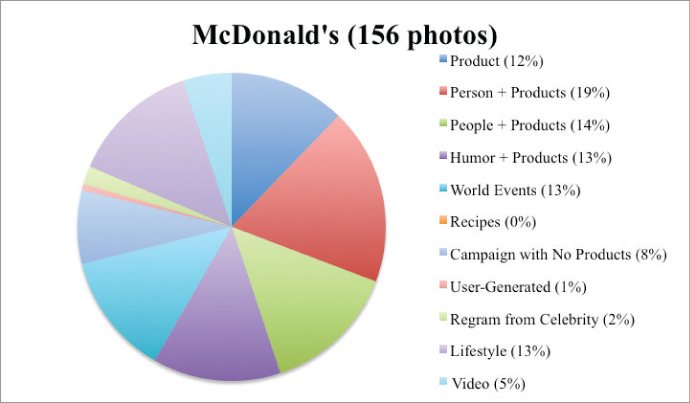
Figure 1. Photo elements featured in McDonald’s Instagram account.

Figure 2. Examples of McDonald’s cheerful and spirited personality.
Appendix II: Taco Bell
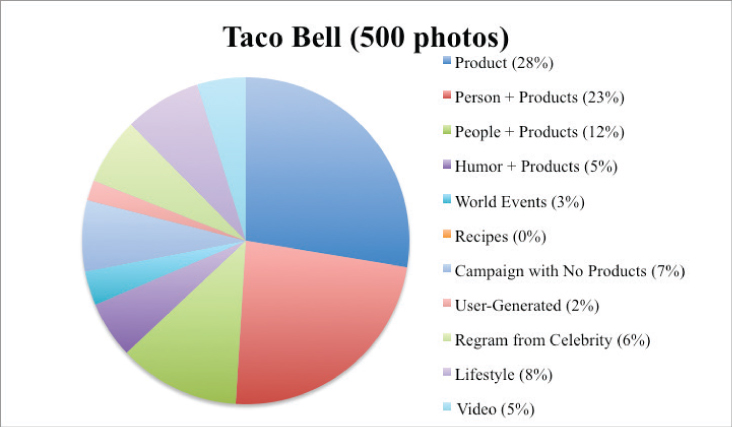
Figure 3. Photo elements featured in Taco Bell’s Instagram account.
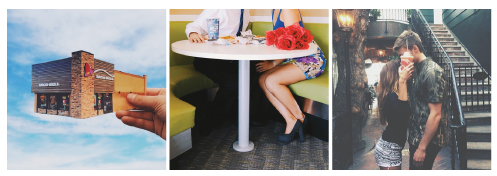
Figure 4. Examples of Taco Bell’s genuine and imaginative personality.
Appendix III: Shredz
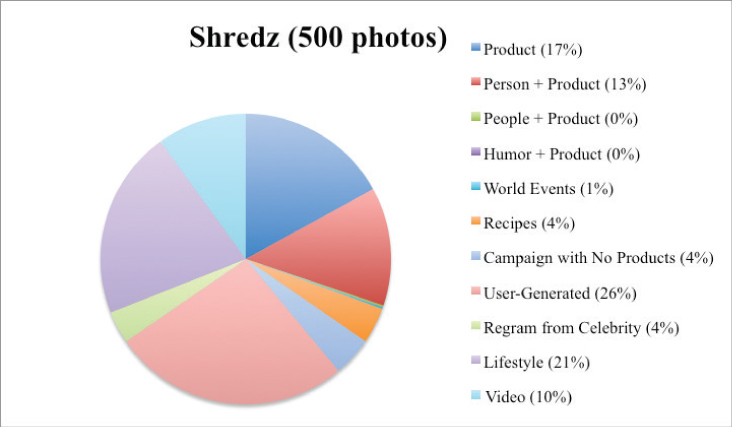
Figure 5. Photo elements featured in Shredz’s Instagram account.

Figure 6. Examples of Shredz’s tough and reliable personality.
Appendix IV: Ben & Jerry’s
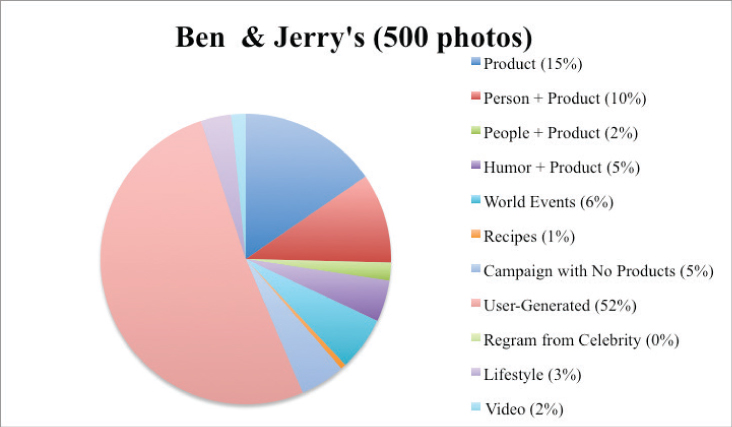
Figure 7. Photo elements featured in Ben & Jerry’s Instagram account.
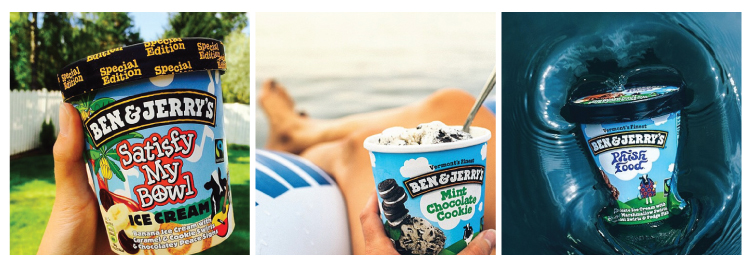
Figure 8. Examples of Ben & Jerry’s honest and light-hearted personality.
Appendix V: Oreo
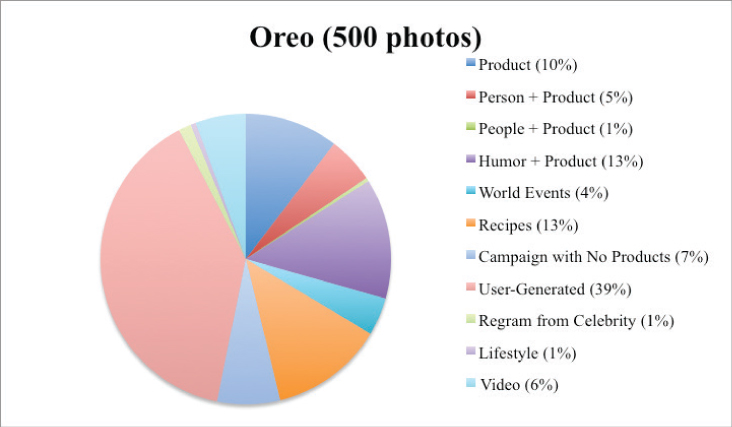
Figure 9. Photo elements featured in Oreo’s Instagram account.
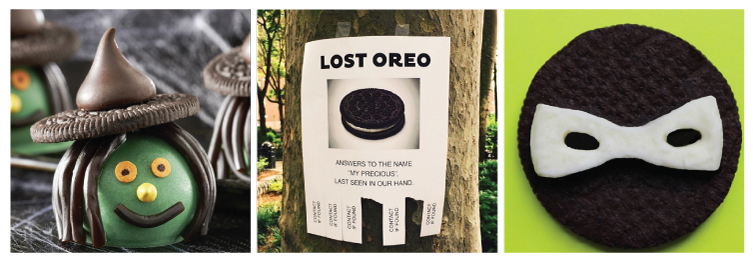
Figure 10. Examples of Oreo’s genuine and imaginative personality.
Save Citation » (Works with EndNote, ProCite, & Reference Manager)
APA 6th
Ginsberg, K. (2015). "Instabranding: Shaping the Personalities of the Top Food Brands on Instagram." Elon Journal of Undergraduate Research in Communications, 6(1). Retrieved from http://www.inquiriesjournal.com/a?id=1131
MLA
Ginsberg, Kate. "Instabranding: Shaping the Personalities of the Top Food Brands on Instagram." Elon Journal of Undergraduate Research in Communications 6.1 (2015). <http://www.inquiriesjournal.com/a?id=1131>
Chicago 16th
Ginsberg, Kate. 2015. Instabranding: Shaping the Personalities of the Top Food Brands on Instagram. Elon Journal of Undergraduate Research in Communications 6 (1), http://www.inquiriesjournal.com/a?id=1131
Harvard
GINSBERG, K. 2015. Instabranding: Shaping the Personalities of the Top Food Brands on Instagram. Elon Journal of Undergraduate Research in Communications [Online], 6. Available: http://www.inquiriesjournal.com/a?id=1131
Suggested Reading from Inquiries Journal
Instagram, a social media app, is becoming increasingly popular as a business and communication tool. Analyzing 12 posts on Dunkin' Donuts' Instagram account, this case study attempted to understand branding through framing theory. The study found that Dunkin' Donuts used its brand name, logo, colors, and images of its products... MORE»
Instagram allows users to share a snapshot of their lives with a mass audience in a matter of seconds. This capability and power has not gone unnoticed by celebrities, who are highly aware of the impact their social media accounts have on fans and the relationships they create. The purpose of this study is to find fan engagement... MORE»
Today, more than 15 million Americans practice yoga, making the ancient Indian discipline synonymous with the Western society's culture of wellness. As a way to market themselves, practitioners and instructors of yoga have utilized Instagram – and its more than 300 million accounts – to virtually share their favorite... MORE»
As the world becomes more technologically advanced, the demand for two-way communication between brand and consumer has become stronger. This study tried to develop a relationship between the rise in new media and luxury brands by content analyzing Chanel, Dior, and Burberry’s YouTube channels that aims to categorize their... MORE»
Latest in Business & Communications
2021, Vol. 13 No. 09
This research lies at the nexus of political communication theory relating to emotional affect and political processing and the burgeoning field of sentiment analysis. News coverage can affect opinion both through the information it provides and... Read Article »
2021, Vol. 13 No. 06
This research study explores factors that present barriers to reporting workplace incidents and contribute to cultures of non-report. The research purpose was to explore human, workplace/organizational, and external factors identified by industrial... Read Article »
2016, Vol. 8 No. 11
In its beta release, Google Glass was positioned as a groundbreaking technology - a glimpse into a future that has long been promised in science fiction. It was met with media fanfare and consumer interest, despite costing more than most PCs on... Read Article »
2016, Vol. 7 No. 1
Predicting the future of the news industry begins with understanding the history of newspapers and the current news delivery landscape. Because the Internet has brought fundamental shifts to news distribution, successful organizations of the future... Read Article »
2016, Vol. 7 No. 1
Instagram allows users to share a snapshot of their lives with a mass audience in a matter of seconds. This capability and power has not gone unnoticed by celebrities, who are highly aware of the impact their social media accounts have on fans and... Read Article »
2016, Vol. 7 No. 1
Since its development, YouTube, the world's third most popular online destination, has transformed from a video-sharing site into a job opportunity for content creators in both new and mainstream media. Based on content analysis, the study examined... Read Article »
2016, Vol. 7 No. 1
Today, more than 15 million Americans practice yoga, making the ancient Indian discipline synonymous with the Western society's culture of wellness. As a way to market themselves, practitioners and instructors of yoga have utilized Instagram &ndash... Read Article »
|






































